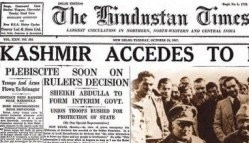What does Article 370 have to say about the disputed territory of Kashmir, one of the most contentious issues between India and Pakistan?
A few months back Jammu and Kashmir Chief Minister Omar Abdullah tweeted “Mark my words & save this tweet – long after Modi Govt is a distant memory either J&K won’t be part of India or Art 370 will still exist. Art 370 is the ONLY constitutional link between J&K & rest of India. Talk of revocation of not just ill informed it’s irresponsible.”
What is Article 370?
By far, the most debated and discussed article in the entire Indian Constitution, Mr. Narendra Modi’s suggestion on a debate on the abrogation of Article 370, has once again brought this provision in the limelight.
Many people are unaware how and why this article was formulated and included in the Indian constitution despite grave misgivings of Sardar Patel, one of India’s founding fathers, and indeed a large number of the members of congress working committee constituent assembly.
Located in a strategic geographic area of great significance, the global powers have also added their own weight behind complicating matters in Kashmir. Kashmir remains one of the most contentious issues between India and Pakistan. Moreover, the communal forces in India have been making it a heated topic since independence.
Those gripped by religious nationalism are unable to understand the regional-ethnic aspirations of the people. Many ultra-nationalists also fall into this trap many a time.
According to the Indian Constitution, Article 370 is a law that grants special autonomous status to Jammu and Kashmir. The article is drafted in Part XXI of the Constitution (in Amendment section) which relates to Temporary, Transitional and Special Provisions.
History
India and Pakistan gained their independence in August 1947; Jammu and Kashmir (J&K) chose to remain neutral by not joining any dominion. At the time of independence, the ruler of J&K Maharaja Hari Singh signed a standstill agreement with Pakistan. But India refused to sign any such agreement with him.
During partition in 1947, Kashmir was split as well, with two-thirds going to India and a third going to Pakistan, even though India’s share was predominantly Muslim, like Pakistan. However, on October 6, 1947, Pakistani Muslim tribes, supported by the government of Pakistan, hearing of Hindu atrocities in Muslim dominated Poonch region, attacked J&K.
To save his state the Maharaja signed an Instrument of Accession to India under mysterious circumstances, so that India could help in defending J & K. The issue wasn’t settled until a 1949 controversial cease-fire brokered by the United Nations and a resolution calling for a referendum, or plebiscite. But India never conducted one, while there has been a cry from many corners that a plebiscite was necessary at that time. India never took the matter to the UN for a decision on the accession of Kashmir, but to broker a ceasefire and decide a timeline for removal of the infiltrators.
Dr. B R Ambedkar, the principal drafter of the Indian constitution, had refused to draft Article 370. In 1949, Prime MinsterJawaharlal Nehru directed Kashmiri leader Sheikh Abdullah to consult a law minister to prepare a draft of a suitable article to be included in the constitution. Article 370 was eventually drafted by Gopalaswami Ayyangar, a minister without portfolio in the first union cabinet of India.
While Nehru eventually took the J&K issue to the UN, Sheikh Abdullah, driven by his ambition to be ruler of an independent Kashmir and his hatred for the Maharaja, persuaded Nehru to give special status to the territory.
The most sinister aspect of the proposed Article 370 was the provision that any changes could be brought about in it only by the concurrence of J&K assembly.
Nehru’s promise that Article 370 was temporary and would get eroded over a period of time has turned out to be a chimera. The first thing that Sheikh Abdullah completed was to abolish hereditary monarchy and redesignate himself as president who was to be elected by the Assembly. It was not until 1956 that the accession of the J&K state into the Indian Union was approved by J&K Assembly.
Whereas the other states later signed merger agreements, the relationship of J&K with the rest of the country was governed by a special set of circumstances, and hence given a special position. It was in the pursuance of those commitments that Article 370 was incorporated in the Constitution.
Hence J&K has a separate Constitution of its own. The Constitution of J&K was enacted by a separate Constituent Assembly set up by the state and it came into force on November 17, 1956. The Constitution of Jammu & Kashmir, which Dr. Karan Singh signed into law, is still in force.
All the provisions of the Constitution which are applicable to other states are not applicable to J&K. For example, until 1965, J&K had a president for governor and prime minister in place of chief minister.
Union legislature has very limited jurisdiction in case of J&K as compared to other states. Until 1963, Parliament could legislate on subjects contained in the Union List, and had no jurisdiction in case of Concurrent List under 7th Schedule with J&K. The Parliament has no power to legislate Preventive Detention laws for the state; only the state legislature has the power to do so.
It is the only state which does not have to give a detailed record on the money flowing in the state and where and how it is used.
In the Indian Constitutional history only one fundamental right has been added so far and that is right to education. This right does not extend to J&K.
This article specifies that except for defense, foreign affairs, finance and communications,the Indian Parliament needs the state government’s concurrence for applying all other laws. Thus the state’s residents lived under a separate set of laws, including those related to citizenship, ownership of property, and fundamental rights, as compared to other Indians.
Why Article 370 is crucial to full J&K integration in India
- First the central government can make laws only with concurrence of the state government, practically giving it veto power.
- Article 352 and 360 for declaration of national and financial emergency respectively cannot be applied in Kashmir.
- While a citizen of India has only Indian citizenship, J&K citizens have dual citizenship.
- Anti-Defection Law is not applicable to J&K. No outsider can buy property in J&K state.
- The beneficial laws such as Wealth Tax, Gift Tax & Urban Land Ceiling Act and intermarriage with other Indian nationals do not operate in J&K state.
- Even Article 356 under which the Indian President can impose his rule in any state cannot be enforced in J&K without consent of the governor who himself is an appointee of the president.
- J&K can refuse building of any cantonment on any site or refuse to allot land for defense purposes. The Indian Supreme Court has no jurisdiction in J&K.
- Disrespecting the tricolor and other national symbols is not a crime in the state.
- A Pakistani resident gains J&K citizenship if he marries a J&K citizen.
It is often forgotten that J&K is not a homogeneous entity. Apart from Valley Muslims, Jammu has a predominantly Hindu population while Ladakh has a mix of Buddhists and Muslims. You also have the Gujjars and Bakarwal tribes.
Should a state of the Indian Union have a special status?
In my personal view, it conveys a wrong signal not only to Kashmiris but also to the separatists, Pakistan and indeed the international community that J&K is still to become an integral part of India. The sooner we make amendments or eradicate this, the better it would be. Obviously the base has to be a comprehensive analysis whether this has been beneficial or not for the citizens and the state itself in a global scenario.
Today when Kashmir is suffering with floods I checked on Muslim Kashmiri friends of mine and I was disheartened to know that in their view, India was not doing enough because India doesn’t consider Kashmir as part of its territory or the Muslim inhabitants as citizens.
The question is will Prime Minister Modi be able to review and sort out this confusion. This not only leads to communal disharmony but also is a deterrent in the valley’s development as country’s number one tourist destination like it was before.
Any meaningful debate on Article 370 must take place; however, there has to be a separation of myth from reality and fact from fiction.


Recent Comments